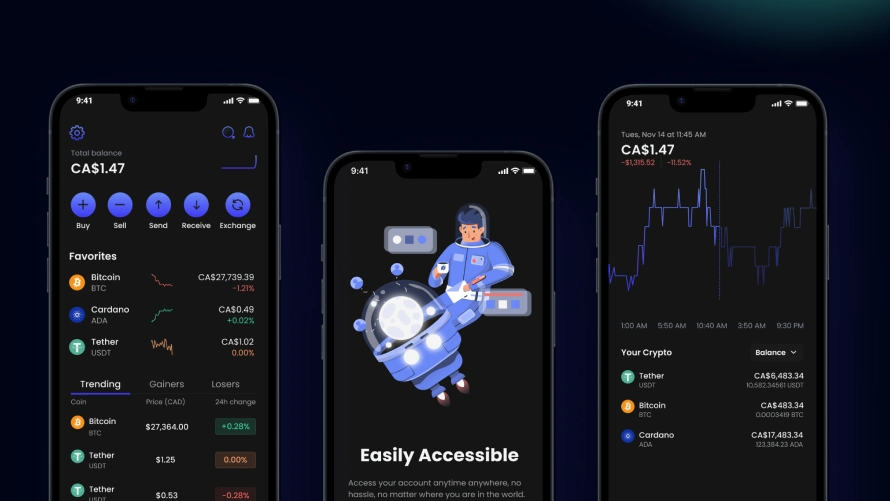FinTech has shown unprecedented growth over the years, boosting the demand for FinTech app development companies. FinTech applications provide enhanced security, data protection, convenience, and accessibility.
The proliferation of such apps helped reach a wider audience across devices and countries, streamlined everyday processes and reduced associated costs. Banks, financial institutions and companies hire FinTech developers to innovate their business and reap the benefits FinTech has to offer.
This guide explains how to recruit FinTech developers, where to find specialists, and what qualifications to look for.
Key Statistics
 698.48 Billion
698.48 Billion
The global fintech technology market size is expected to reach $698.48 billion by 2030 at a CAGR of 20.3%.
 52.4 Billion
52.4 Billion
In the first half of 2023, the global investment value of the FinTech sector amounted to $52.4 billion.
 35%
35%
As of May 2023, the Americas is the biggest FinTech market, (35% of the global market) with 11,651 FinTech startups.
Who is a FinTech Developer?
A financial software developer is a professional in building digital solutions for the financial industry. They play a crucial role in creating, developing, and maintaining FinTech apps that increase the security and convenience of everyday financial operations.
The main job of a FinTech programmer is coding, testing, and debugging the software to guarantee its seamless operation. However, a FinTech development team is made up of more than just developers. Financial Technology (FinTech) encompasses a wide range of digital solutions used to provide financial services and products to customers.
Financial Technology (FinTech) encompasses a wide range of digital solutions used to provide financial services and products to customers. FinTech development companies offer online banking and DeFi development services, design money-transferring platforms and cryptocurrency exchange
To ensure the app’s success, you need to hire a FinTech designer to create an intuitive and user-friendly interface and enhance user experience. Hire FinTech consultants to integrate modern technologies and streamline processes in compliance with financial regulations.

Skills to Look For in FinTech Developers
Hard Skills
The front-end refers to the client side of a FinTech application that the users can see and interact with. Front-end developers translate design into code, providing a smooth and enjoyable user experience.
To properly perform their work, they need to possess the following knowledge and skills:
- FinTech programming languages, frameworks and libraries, like JavaScript, Python, React, React Native, Flutter, HTML, AngularJS, and jQuery;
- How to test mobile and web applications on different devices and platforms;
- Web Performance Optimization (WPO) to provide faster loading time;
- Search engine optimization (SEO) to increase organic traffic to the website.
Back-end refers to a server-side FinTech app development invisible to users. Back-end developers are responsible for building and maintaining the core app logic, APIs, servers, databases, etc.
Experienced developers must possess the following knowledge and skills:
- FinTech programming languages, databases, and tools, like Java, Ruby, Node.js, PHP, C++, MySQL, MongoDB, AWS, and Microsoft Azure;
- Use relational (SQL) and non-relational databases (NoSQL);
- Create servers and process user requests;
- Create and deploy data structures;
- Create Application Programming Interfaces (APIs).
Soft Skills
- Communication skills. Good communication skills help build trust and cooperation and avoid conflict and misunderstanding within the development team.
- Problem-solving skills. Experienced developers should be able to quickly identify a problem and its cause and come up with an appropriate and effective solution.
- Adaptability and flexibility. Developers must adapt to the changing circumstances and deal with new issues as they arise.
- Proactivity. Proactive developers don’t wait for directions and don’t require constant supervision. They can work independently, anticipate, and prevent potential problems.
- Time management. Meeting deadlines is critical to the timely and successful completion of the product development process. Developers must be able to estimate and allocate the time needed to accomplish certain tasks.
4 Ways to Hire FinTech Developers
-
Outsourcing
Software development outsourcing means hiring a third-party service provider to handle app development projects. It allows company leaders to focus on their business needs and goals while the team of experts manages technical requirements. Companies providing FinTech app development services help create an app time- and cost-effectively and provide access to a large talent pool.
-
Freelance hiring
A freelancer is a self-employed professional serving multiple clients across the world for a negotiated price. Usually, freelance recruiting depends on two main types of agreements, like hourly rate and fixed project price. While it’s one of the most cost-effective ways of hiring, it also entails risks connected with reliability and resource control. Freelancers can be less motivated and invested in their work, which results in negligent attitude and delays.
-
Staff augmentation
Software development staff augmentation is a form of outsourcing where a software company provides its professionals through external hire, generally on a time & materials contract basis. This model allows the company to augment the in-house development team with the needed specialists with specific skills and expertise depending on the product requirements for the time of the project.
-
Dedicated team model
A dedicated team model offers a hand-picked team of professionals focused on one specific project and working under the hiring company’s control. You get a complete team of FinTech developers instead of building a team from scratch. You can also hire FinTech designers, QA Engineers, Project Managers, Business Analysts, etc. This model is popular in long-term and large FinTech software development projects, as it guarantees effective workflow and top-quality end product.
How to Find FinTech Developers?
The chosen method of sourcing and recruiting FinTech developers depends on the project requirements, budget, preferred hiring model, etc. Below, we have listed the most popular and effective ways to find FinTech software developers.

Tech Job Boards
Tech job boards are specialized tech platforms connecting companies searching for professionals with a specific skill set and experience to potential candidates. Such websites help streamline hiring processes, providing access to a large pool of tech experts with relevant qualifications and skills. All you need to do is post a job ad with a detailed description and review applicants’ resumes and portfolios.
Below, you can find the top 5 tech job boards to hire financial software developers:
- Wellfound (formerly AngelList Talent);
- Dice;
- Blind;
- CrunchBoard;
- LinkedIn.
Freelancers
Hiring freelance developers can be a good idea for startups due to comparatively low costs and their flexibility. However, this option isn’t suitable for long-term cooperation or large projects, as freelancers are not a full-fledged part of the team and, therefore, are less driven and invested in their work.

Below, you can take a look at the top 5 websites for hiring freelance FinTech programmers:
- Toptal;
- Fiverr;
- Upwork;
- Gaper;
- Remotebase.
Recruiting Firms
Recruiting firms can help you hire a FinTech developer fast in case it’s urgent or you want to delegate the candidate screening process. Although their services are costly, it’s a great alternative to using in-house headhunters, especially for large corporations with sufficient resources. Recruiting companies do all the work connected with hiring, like searching for candidates via social media and professional networks, evaluating prospects, and scheduling meetings with the shortlisted applicants. In this way, you quickly get access to top-notch professionals who have already been vetted and pre-interviewed.

Outsorsing
Outsourcing FinTech application development allows companies to hire overseas professionals, often having a higher expertise and working for a lower price than the in-house developers. At the same time, you potentially run the risks of miscommunication and quality control.
To mitigate risks, conduct extensive research and explore what FinTech software company has already built and what customers it has already worked with. This will help you understand what tech stack, UI/UX design, and features the provider uses and how it addresses the challenges.
Pay attention to the feedback left by previous clients, as it can tell you a lot about the company’s professionalism, communication, and flexibility. To be sure about the provider’s expertise, you can gather feedback from their previous customers or check verified reviews on platforms like Clutch or GoodFirms.

An 8-Step FinTech Software Developer Hiring Process
-
Define the project’s goals, functionality, and tech requirements. Early and thorough analysis improves hiring efficiency and reduces the likelihood of mis-hires, saving time and money.
-
Create your company profile and describe your services, industries you work in, corporate culture, and bonuses you provide. Add your company logo and links to your website and professional networking profiles.
-
Prepare a detailed job description that includes required skills, tech stack proficiency, domain expertise, responsibilities, the type of project they will be working on, etc.
-
Use multiple platforms and websites to post your job ads to increase the chances of finding suitable candidates.
-
Review the CVs and portfolios of the applicants, paying attention to their proficiency in the required tech stack, knowledge of cybersecurity, and experience in smart contract development.
-
Conduct technical interviews with the shortlisted candidates, check their hard and soft skills, and provide a coding test task.
-
Check references from previous employers or clients to get insights into the candidate’s qualifications, reliability, and professionalism. This step will help you assess the candidate’s overall performance and compatibility with your team.
-
Make a job offer, negotiate, and hire a suitable candidate. Start the detailed onboarding process to ensure smooth integration into the team and company processes.
How Much Does It Cost to Hire FinTech Programmers?
A FinTech developer salary depends on two main factors: the location and the seniority level (junior, middle, senior).
The estimated hourly rates of developers across the countries are as follows:
Region
Hourly costs
North America (the USA, Canada, etc.)
$40-150
Europe (UK, France, Italy, etc.)
$45-100
Gulf Countries (UAE, Saudi Arabia, etc.)
$30-120
Asia (India, Russia, Japan, China, etc.)
$15-50
Australia & New Zealand
$35-150
Real-Life Cases of FinTech Software Development
Coinhook

The Coinhook founder came to us with the idea to build a centralized cryptocurrency exchange platform that would act as an intermediary between buyers and sellers, monetizing through fees and transaction commissions.
As a result, we created a cross-platform mobile application powered by React Native and offered to use AI for a paybyface feature. As security is crucial for FinTech apps, our team developed a multi-factor verification process through a third-party service that ensures the highest levels of data protection.
How Can Interexy Help?
Interexy is a web & mobile FinTech software development company. We provide blockchain and NFT token development services, building apps for investment, personal finance management, and online payments. Our team also offers digital banking, InsurTech, and Web3 development solutions.
At Interexy, we have a skilled team of FinTech developers with in-depth expertise who will ensure high product quality and timely delivery of your FinTech application. Our specialists will provide you with technological guidance and continuous support during the whole development process.
At Interexy, you can choose a cooperation model that suits you – IT staff augmentation, full project outsourcing, or hiring a dedicated team. We offer candidates within 5-10 business days to kick off the project as soon as possible.
Explore our FinTech expertise and find out how Interexy can help you!
Book a call with our expertsFinal Thoughts
FinTech has become an integral part of our everyday life, that’s why now is the best time to invest in FinTech application development. All you need to do is find a trusted development company to help you build a FinTech application that brings profit and value. There are several hiring options to choose from, so you need to meticulously weigh up all the pros and cons before making a decision. When recruiting FinTech professionals, you must focus on your project’s goals, features, budget, and scope of work.
FAQs
-
What skills should I pay attention to when hiring FinTech developers?
When searching for a FinTech developer, check the candidate’s hard, soft skills and their previous relevant experience. Hard skills include knowledge of programming languages, frameworks, databases, and working experience with servers, APIs, data structures, and WPO. As for soft skills, you should pay attention to their communication and problem-solving skills, flexibility, proactivity, and ability to meet deadlines.
-
What are the most common programming languages in FinTech?
Some of the most used programming languages in the FinTech industry are JavaScript, Python, React, Flutter, Ruby, Node.js, and C++.
-
What are the most popular ways to hire financial software developers?
Typically, the following hiring models are used: staff augmentation, project outsourcing, and hiring dedicated teams or freelancers.
-
Where can I find FinTech developers?
Outsourcing FinTech software development is the most popular option. To be sure about the company’s expertise, conduct research, gather feedback from previous customers, and check verified reviews on platforms like Clutch or GoodFirms. You can also post your job ads on tech job boards, like Dice and Blind, or hire freelancers from websites like Fiverr and Upwork. Another option is to use the services of recruiting firms, who will do the sourcing and vetting process for you.




